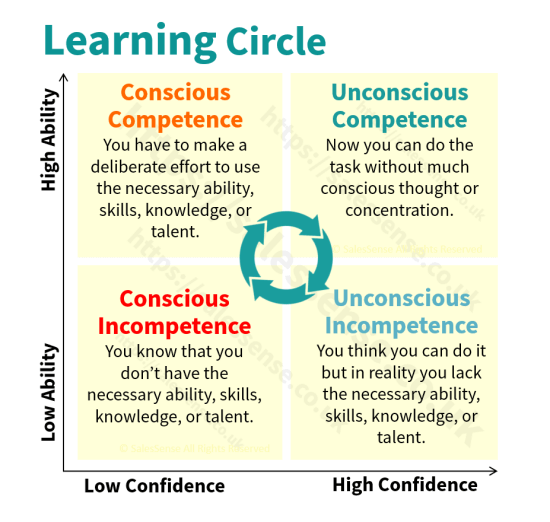The essential additional skills for business to business selling competence.

Making higher-value B2B sales is very different from selling to an individual. Business to business selling demands a superset of knowledge, abilities, and practices.
What is business to business selling?
While all selling involves communicating with people, business to business selling is communicating with businesses about their purchase of plant and machinery, infrastructure, improvement solutions, components, consumables, and investments. A B2B seller may represent products or services in one or more of these categories.
How is business to business selling different?
The following are five significant differences between business to business selling and business to consumer selling. Each requires additional knowledge, skills, and habits to navigate successfully.
1. The number of people involved.
The most obvious B2B sales difference is the number of people involved in decisions. Of course, some decisions are made by individuals in isolation. This is true for low-value commodities and sometimes for components. Even for low-value items, several people are usually interested in what is bought.
For business to business selling, I assign buying role labels to six groups: Veto; Official Decision Maker; Assessor; User; Decision Influencer, and Approver.
Each group has a different function in the B2B decision-making process. Although one individual is usually officially empowered to make the decision, this person rarely makes any high-value buying decisions without being sure of support from other roles. To do so risks reputation, career progression, and relationships.
Of these buying roles, which is the most influential?
I'm sure you will have realised that the answer may be different in each sales situation. Why then, are most B2B sales based on conversations with a single person?
Whoever the person is, he or she will have either claimed the decision-maker role or have been granted it by the salesperson.
At best this is perilous because all information is filtered through this one person's perspective. At worst, it means complete exclusion from the customer's buying process.
B2B salespeople need to engage with those in all six buying roles. For large requirements and those impacting a lot of people, there can be dozens of people with significant influence over a buying decision.
2. The budgeting and buying process.
So many B2B sales gallop towards a conclusion without the salesperson having any idea if the customer has set aside enough money to pay for it.
The assumption is that the customer wouldn't waste their time if they didn't have the money. This might be a fair assumption if the salesperson communicates with a budget holder with sufficient funds and complete freedom to spend the money. Except for the smallest of sales, this is seldom the case. Even cash-rich organisations can't spend on a whim. All organisations with more than 20 or so employees, set up elaborate procedures to ensure that money is not spent unless the need and justification are clear, documented, and approved according to established policies and procedures.
Customers can change their minds at any point in their buying process. Budgets can be reduced or diverted for other purposes perceived to have more importance, urgency, or political support. Being satisfied by one of the common budget question fob-off responses such as, "Don't worry about the money", is like driving while wearing a blindfold.
3. The customer's customers and market.
Salespeople who merely know their product or service offering are perceived to run with the crowd. The business decision-makers involved in all but the smallest purchasing decisions are senior executives concerned with the challenges of running their business. They want to discuss solutions that address their needs, problems, and opportunities, not products and services.
A business to business salesperson's credibility with senior executives rests on his or her market and industry knowledge much more than products or services. It is necessary to understand what the customer sells, how they sell it, and who they sell it to if a salesperson is to establish credibility with senior decision-makers.
4. The Customer's Business
When selling to individuals - private citizens - it is appropriate to be a student of human nature. Since we all have first-hand knowledge of human nature, it's not such a great leap to understand another person's perspective.
When selling to a business, it is appropriate to be a student of business and very few salespeople have any experience of managing an enterprise. If business to business salespeople are to have empathy for the challenges faced by the leaders and policymakers they need to influence, gaining an appreciation of what's involved is essential.
More than this, B2B salespeople must equip themselves to assess any business they might sell to just as effectively as a top management consultant. They must make themselves commercially astute.
5. Organisational dynamics (politics).
Politics in a sale to consumers or individuals seldom extends beyond the dynamics between a husband and wife or between family members. People everywhere have different ideas about the best way to get things done and different levels of personal ambition. Politics exists in every business.
Many B2B sales are won and lost without ever having direct contact with the most influential people involved in the decision. Business salespeople need the ability to get things done through others.
At the very least, those who intend to be influential must be able to discern the political ebb and flow in an organisation.
What are the essential business to business selling skills?
In the competitive realm of business-to-business (B2B) selling, success relies on more than just a persuasive pitch. It demands a comprehensive skill set tailored to meet the unique challenges of engaging with other businesses. Whether you are a seasoned professional or a novice in the field, honing these essential skills can dramatically enhance your effectiveness and drive sustainable results.
1. Deep Product and Industry Knowledge
Understanding your product or service inside and out is foundational to business-to-business selling. Clients expect sales representatives to provide detailed insights and articulate how the product meets their specific needs. Equally important is having a strong grasp of the industry landscape, including emerging trends, regulatory changes, and competitors. This knowledge not only establishes credibility but also allows you to tailor your approach to align with the client’s objectives.
For example, if you are selling enterprise software, it is essential to understand not just the software’s technical capabilities but also how it integrates into existing systems, complies with data regulations, and addresses industry-specific pain points. Investing time in continuous learning ensures you stay ahead of the curve.
2. Active Listening and Empathy
Successful business-to-business selling hinges on understanding the client’s unique challenges and goals. Active listening—fully concentrating on what the client is saying without formulating your response prematurely—is a critical skill. This ensures that you grasp the nuances of their concerns and aspirations.
Empathy complements active listening by enabling you to see the situation from the client’s perspective. When clients feel understood, they are more likely to trust your recommendations. This trust can transform transactional relationships into long-term partnerships.
3. Effective Communication Skills
Clear and concise communication is vital at every stage of the business-to-business selling process. Whether you are delivering a presentation, crafting an email, or negotiating terms, your ability to convey ideas effectively can make or break a deal. This skill encompasses both verbal and written communication.
Additionally, tailoring your communication style to the preferences of your audience is crucial. For instance, a technical buyer may appreciate detailed specifications, while a C-suite executive might prioritise a high-level overview of return on investment (ROI). Adapting your messaging to different stakeholders ensures that your value proposition resonates with everyone involved.
4. Building Rapport and Relationships
In business-to-business selling, relationships often matter as much as the product itself. Building rapport requires genuine interest in the client’s business and a commitment to fostering trust. This involves consistent follow-ups, personalised interactions, and a proactive approach to problem-solving.
Strong relationships create a foundation for repeat business and referrals. Moreover, they can act as a buffer during challenging times, such as when a competitor undercuts your pricing or a product issue arises. Clients are more likely to remain loyal if they perceive you as a reliable and invested partner.
5. Consultative Selling
Gone are the days of hard selling. Modern business-to-business selling emphasises a consultative approach, where the salesperson acts as an advisor rather than a mere vendor. This involves diagnosing the client’s problems, proposing tailored solutions, and demonstrating how your product or service adds value.
Consultative selling requires a blend of analytical skills and creativity. It involves asking probing questions to uncover underlying needs and presenting solutions that align with the client’s strategic goals. This approach positions you as a partner in their success rather than just a supplier.
6. Negotiation Skills
Negotiation is an inevitable part of business-to-business selling. Whether it’s about pricing, contract terms, or delivery timelines, your ability to navigate these discussions can significantly impact the deal’s outcome. Effective negotiation involves finding a balance where both parties feel they have gained value.
Preparation is key. Before entering negotiations, understand your client’s priorities and potential objections. Having a clear idea of your bottom line and being prepared to walk away if necessary ensures that you don’t compromise excessively. Additionally, practising collaborative negotiation—where you focus on creating win-win scenarios—can strengthen relationships and set the stage for future collaborations.
7. Selective Prospecting
Identifying and targeting the right prospects is essential for efficient business-to-business selling. Not every lead will be a good fit for your offering, so strategic prospecting helps prioritise efforts where they are most likely to yield results. This involves researching potential clients to assess their needs, budget, and decision-making processes.
Leverage tools like customer relationship management (CRM) software, social media platforms, and industry networks to identify and engage high-potential leads. A targeted approach reduces wasted effort and increases the likelihood of meaningful interactions.
8. Time Management and Organisation
Business-to-business selling cycles can be lengthy and involve multiple stakeholders. Effective time management ensures that you stay on top of tasks without missing opportunities. This includes prioritising leads, scheduling follow-ups, and maintaining an organised record of client interactions.
Using digital tools to streamline administrative tasks and track progress can enhance productivity. For example, setting reminders for key deadlines or using project management software to track the status of multiple deals ensures that nothing falls through the cracks.
9. Resilience and Adaptability
Rejection and setbacks are inevitable in sales. Resilience—the ability to bounce back from disappointments—is a crucial trait for success. It helps maintain motivation and focus even when deals don’t go as planned.
Adaptability complements resilience by allowing you to adjust your approach based on changing circumstances. For instance, if a client’s priorities shift due to market conditions, being flexible enough to revise your proposal can keep the deal alive. Embracing a growth mindset enables continuous improvement and innovation.
10. Data-Driven Decision Making
Modern business-to-business selling relies heavily on data to inform strategies and measure success. Analysing metrics such as conversion rates, customer acquisition costs, and client retention rates provides valuable insights into what is working and what isn’t.
Using data to personalise interactions—such as tailoring your pitch based on a client’s purchase history or industry trends—can significantly enhance effectiveness. Additionally, leveraging analytics tools to forecast sales and identify growth opportunities ensures that you remain proactive rather than reactive.
11. Understanding Decision-Making Processes
Business-to-business purchases often involve multiple stakeholders, each with their own priorities and concerns. Understanding the decision-making process within a client organisation is critical for navigating complex sales cycles.
This involves identifying key decision-makers, influencers, and gatekeepers. Tailoring your approach to address each stakeholder’s unique needs ensures that your proposal gains traction at every level. Building consensus among diverse stakeholders requires patience, diplomacy, and strategic communication.
12. Leveraging Technology
The digital revolution has transformed business-to-business selling. From CRM systems to artificial intelligence (AI)-driven analytics, technology offers tools to enhance efficiency and effectiveness. For instance, AI can help identify patterns in client behaviour, enabling you to anticipate needs and personalise outreach.
Embracing technology also involves staying updated on digital communication channels. Virtual meetings, email marketing, and social media platforms are increasingly integral to connecting with clients. Developing proficiency in these tools ensures that you remain competitive in a rapidly evolving landscape.
13. Customer-Centric Mindset
At the heart of successful business-to-business selling is a customer-centric mindset. This involves prioritising the client’s needs over short-term gains and focusing on delivering value. By aligning your goals with the client’s success, you create a foundation for long-term partnerships.
This mindset requires continuous engagement with clients, even after the sale is closed. Providing ongoing support, soliciting feedback, and proactively addressing issues demonstrate your commitment to their success and foster loyalty.
In Summary
Mastering business-to-business selling requires a combination of technical expertise, interpersonal skills, and strategic thinking. By cultivating deep product knowledge, practising active listening, building strong relationships, and leveraging technology, sales professionals can navigate the complexities of the business-to-business landscape with confidence.
Equally important is the ability to adapt to evolving client needs and market dynamics. In an increasingly competitive environment, those who prioritise continuous learning and a customer-centric approach are best positioned to thrive. With these essential skills, business-to-business sales professionals can not only achieve their targets but also build enduring partnerships that drive mutual success.
Business to Business Selling Competence
High-value B2B salespeople need to coordinate the efforts of others in their organisation and manage customer interactions throughout the customer's buying process. Some B2B sales take a year or more to conclude and most take at least several weeks. Business to business selling demands vastly more knowledge, many more skills, and much better organisation than for B2C selling.
How can you learn business to business selling?
Test your competence with our free sales assessments.
See the free learning resources here.
Schedule an informal call.
Article by Clive Miller
The content on this website, our courses, and assessments are focused on B2B sales. If you need to develop business to business selling skills, we can help. Telephone +44 (0)1392 851500. We will be pleased to discuss your needs or talk through some options. Alternatively, email custserv@salessense.co.uk or use the contact form here.






















